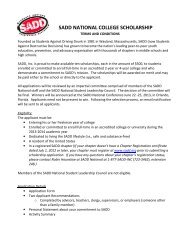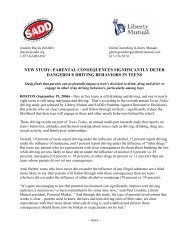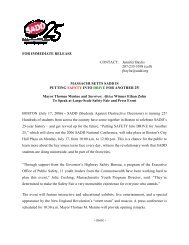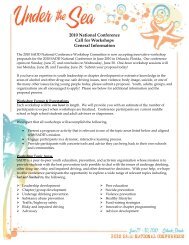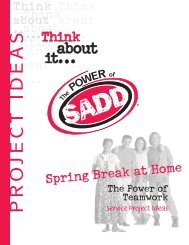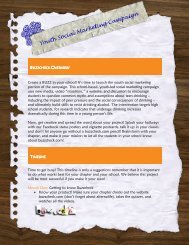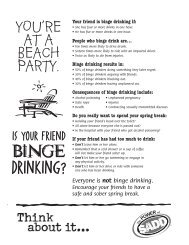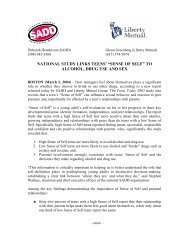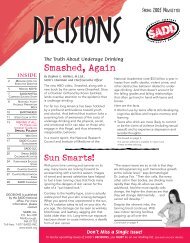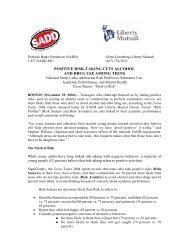Fund-raising - SADD
Fund-raising - SADD
Fund-raising - SADD
Create successful ePaper yourself
Turn your PDF publications into a flip-book with our unique Google optimized e-Paper software.
The POWER<br />
of<br />
The POWER<br />
The<br />
Power<br />
Packet
The<br />
Power<br />
Packet<br />
With school back in<br />
session, your <strong>SADD</strong><br />
chapter has the opportunity<br />
to expand its<br />
membership, raise<br />
funds to organize<br />
activities and events<br />
that promote the <strong>SADD</strong><br />
message, and collaborate<br />
with parents,<br />
teachers and other<br />
community members.<br />
This booklet is designed<br />
to help you maximize<br />
your time and efforts<br />
as your chapter works<br />
toward ensuring the<br />
safety of the youth in<br />
your community.<br />
Membership<br />
Reflection:<br />
Promoting a<br />
Positive Image<br />
THE 6 RS OFMEMBERSHIP,<br />
COMPILED BY THE FLORIDA PEER<br />
EDUCATION STAFF, ARE LISTED BELOW.<br />
THESE SUGGESTIONS SHOULD HELP GET<br />
YOUR CHAPTER’S MEMBERSHIP DRIVE<br />
STARTED OFF ON THE RIGHT FOOT!<br />
Some <strong>SADD</strong> chapters struggle with an image problem because students think<br />
that the members are trying to stop them from having fun. Nothing could be<br />
further from the truth. <strong>SADD</strong> members are trying to make the middle school<br />
and high school years more fun, enjoyable and, above all else, safe.<br />
• Think positively! Remember that if you spend more time building a fun, positive<br />
image, you won’t have to fight a negative one.<br />
• Always think about your image and how members’ behavior affects the group.<br />
• Promote your chapter’s “No Use” policy, but remember that although this policy<br />
does not condone the use of alcohol and other drugs, it does not mean that<br />
you should exclude those who do use these substances. <strong>SADD</strong> is an inclusive<br />
club.<br />
• <strong>SADD</strong> chapters have a strong concern about many of the behaviors that are<br />
often associated with abusive drinking: violence, poor grades, sexual assault,<br />
and low self-esteem. Spell these out to the community so that if your motives<br />
are questioned, you can show what you are working for and against.<br />
• Define your mission in terms of overall health issues. Promote healthy lifestyles,<br />
positive choices, and the safety of the entire community.<br />
• Have as one of your goals making the school more fun! Co-sponsor existing<br />
events, such as school dances or carnivals, if you are just getting started. The<br />
more experience your chapter gets in planning events, the more elaborate they<br />
can be.<br />
• Use the term “responsible decision-making.” Remind students that if they make<br />
safer decisions, they will be happier and healthier.<br />
• Emphasize that your members struggle with the same issues and choices as<br />
everybody else does.<br />
• Try to avoid using “can’t” and “don’t” when promoting your message.<br />
• Invite members of other clubs in your school to attend your meetings. Foster<br />
opportunities for your groups to work together.<br />
• Use sidewalk chalk to spread your message around the school.<br />
• Avoid scare tactics in your programming. Crashed cars and tombstones have<br />
their place in programming but should only be a part of your efforts.<br />
Think About It…<br />
1
Recruitment:<br />
Tips for Recruiting New<br />
Members<br />
It is important to remember that<br />
everything your chapter does<br />
contributes toward its overall image. Students will<br />
decide to join your <strong>SADD</strong> chapter based on what they<br />
see and hear about your group. Recruiting is a yearlong,<br />
continuous process. Always be prepared to discuss how students can join<br />
your chapter.<br />
• Remember that personal contact is more effective than distributing flyers. Nothing<br />
can replace the simple act of getting to know people and asking them to join your<br />
group.<br />
• Make a brief introduction of your organization at other clubs’ meetings. Remember<br />
that some of the best leaders in your school are probably involved in other clubs,<br />
so go shopping for members.<br />
• Co-sponsor events to gain publicity for your <strong>SADD</strong> chapter.<br />
• Don’t expect individuals to find the motivation to come to a meeting in a room<br />
full of people they don’t know. Offer to meet new members at a central location<br />
and walk with them to the meeting. Be sure to introduce everyone to each other<br />
before the meeting begins.<br />
• Free food is always an incentive for prospective members. Having snacks at meetings<br />
regularly will encourage people to return (especially if your meetings are after<br />
school). Ask each member to provide snacks once or twice a year. Decide on a<br />
theme for each meeting and ask people to bring snacks that match the theme.<br />
• Recruit fellow students based on the issues that interest them. Ask them to work<br />
on a specific campaign or project that suits their interests and talents.<br />
• Pair up returning and new members to complete tasks and serve on committees.<br />
Don’t allow all the returning members to work together; the success of your<br />
program rests on their ability to spread their knowledge and know-how. Your<br />
chapter’s success also relies upon the incorporation of fresh ideas and perspectives<br />
that can only be offered by new members.<br />
• Make your own recruitment video, perform skits, or make announcements to the<br />
entire student body. Remember to make your chapter look like fun!<br />
• Ask a local pizza merchant to stick <strong>SADD</strong> flyers on delivery boxes. They will reach<br />
a huge number of middle school and high school students and their parents.<br />
2 Think About It…
Retention:<br />
Tips on Keeping Members<br />
Motivated<br />
It is important to continually motivate your members.<br />
Find creative ways to motivate your members<br />
and let them know they are appreciated.<br />
• Send as many members as possible to conferences and trainings. Not<br />
only will students welcome the break from school but they also will have an<br />
opportunity to network with students from other schools and to learn something.<br />
• Establish a point system for members. Award a certain number of points for<br />
attending meetings, working on campaigns, etc. Give the highest point winners a<br />
small prize on a monthly or weekly basis.<br />
• Always recognize and applaud achievements. Make certificates for the individuals<br />
or hang their pictures on a bulletin board along with a description of what they<br />
did.<br />
• Acknowledge members’ birthdays.<br />
• Choose a member of the month. Highlight the person’s contributions on a special<br />
bulletin board. Ask local businesses for small donations (such as free pizza or a<br />
car wash coupon) for your member of the month.<br />
• Have a special seniors appreciation day in which your chapter recognizes the work<br />
of committed twelfth graders.<br />
• Nominate your chapter for statewide or national awards.<br />
Membership<br />
Recognition:<br />
Tips for Recognizing<br />
Members<br />
It is very important<br />
for all of your members<br />
to feel appreciated: recognize their<br />
specific contributions. If you value the work<br />
of your members, let them and the rest of the school know!<br />
• Reward members for doing a good job on programs or activities with gift<br />
certificates to restaurants, movies, or concerts.<br />
• Hold a members’ banquet each semester. Present funny awards and a<br />
“Member of the Semester” award.<br />
• Offer specific thanks to a few members at each meeting. Be sure to alternate<br />
who receives this praise.<br />
• Accommodate members’ personal needs and problems that may arise.<br />
• Make sure that your chapter’s photo appears in the school newspaper,<br />
the local newspaper and the school yearbook.<br />
Think About It…<br />
3
Revitalization:<br />
Tips for Making Meetings<br />
More Exciting<br />
Finding a way to make your<br />
meetings more exciting is critical to retaining<br />
the members you have and keeping them interested.<br />
The energy you create in the meetings will flow over into your programs<br />
and affect members’ enthusiasm.<br />
• Start each meeting with a fun icebreaker.<br />
• Introduce new members at the beginning of each meeting. If they are attending<br />
the meeting because a friend recruited them, be sure to recognize the recruiter<br />
as well.<br />
• Always provide members with an agenda so they can follow along.<br />
• Hold meetings outside when the weather is nice.<br />
• Take a break in the middle of each meeting to play a silly game, such as musical<br />
chairs or Twister.<br />
• Have a surprise party instead of a meeting; people will be sorry they missed it and<br />
will be more likely to attend future meetings to be a part of any surprises.<br />
• Give prizes to members who attend ten meetings in a row.<br />
• Ask members to tell jokes every 15 minutes.<br />
• Allow the last 5-10 minutes of each meeting for members to socialize.<br />
• Pass out fortune cookies at meetings and ask everyone to share their fortune.<br />
Resources<br />
Tips for Gaining Faculty Support<br />
• Host a <strong>SADD</strong> chapter/faculty social after school. Offer snacks and<br />
provide a chance for faculty and staff to meet and mingle with the<br />
<strong>SADD</strong> members in an informal setting.<br />
• Send all faculty and staff a letter explaining the goals and mission<br />
of <strong>SADD</strong>. Invite them to attend your meetings and special events.<br />
• Send birthday or holiday cards to the faculty and staff.<br />
Tips for Gaining Support From Your Community<br />
• Publicize your events and activities in local newspapers, in<br />
neighborhood newsletters, or at the supermarket.<br />
• Work with feeder schools to increase membership.<br />
Have a representative from the middle school attend<br />
your meetings.<br />
• Get your members to take part in a regular community<br />
service project. Mentoring middle school or elementary<br />
school students is a great way to start.<br />
• Send information about <strong>SADD</strong> to local pediatricians<br />
to give to parents.<br />
4 Think About It…
<strong>Fund</strong>-<strong>raising</strong><br />
r<br />
Where to Start<br />
Organizing a fund-raiser need not be a daunting task! Here are a few simple tips to<br />
get you started.<br />
e Decide what kind of fund-raiser you will have (see suggestions below).<br />
r Determine a date, time, and place for the event (and a rain date if necessary).<br />
a. Be sure that you select a date that will not conflict with any other school<br />
events or with anything major going on in your city or town. If applicable,<br />
consider coordinating your event with one of these events.<br />
b. Schedule your event at a time when you are likely to get the most volunteers<br />
and the most attendees.<br />
t Delegate responsibilities among the following:<br />
a. Chairperson to oversee the organization of the event<br />
b. Publicity Committee to promote the event within the school and to the<br />
general public<br />
c. Supply Committee to procure necessary supplies or goods (baked<br />
goods, candy for sale, etc.) for your event<br />
d. Volunteer coordinator and scheduler to make sure that the<br />
time and talents of everyone working the event are maximized<br />
e. Setup Committee to prepare for the event<br />
f. Cleanup Committee to clean up the location and return<br />
anything borrowed<br />
g. Donation Committee to solicit local merchants and<br />
businesses for prizes, supplies, or money<br />
u Hold meetings regularly to monitor the progress of the<br />
committees.<br />
i Offer incentives to those selling tickets or to the class that<br />
purchases the most items, etc.<br />
o Promote your event in the school and to the general public.<br />
p Consider having a fund-raiser within a fund-raiser (a bake sale at your<br />
car wash?).<br />
a Write thank you notes to volunteers and donors.<br />
s Collect pledges if necessary.<br />
©<br />
<strong>Fund</strong>-<strong>raising</strong><br />
Think About It… 5
Whom To Involve<br />
Besides asking parents and teachers to sponsor<br />
or participate in your chapter’s fund-raiser,<br />
don’t forget these important people!<br />
• School and <strong>SADD</strong> alumni<br />
• Local merchants (They might donate goods<br />
and services for an auction or raffle or they<br />
might even be willing to match the money<br />
you raise.)<br />
• Local media (Be sure to get press coverage<br />
for your fund-raiser; list it in the local<br />
newspapers, ask the local cable channel to<br />
announce it, or have local TV stations list it<br />
in their calendars.)<br />
Special Services<br />
Be sure to schedule these events on weekends,<br />
when you are most likely to involve the general<br />
public and when parents have some free time<br />
to help run the events.<br />
• Car wash<br />
• Dog wash<br />
• Student services auction (baby-sitting,<br />
typing, car washing)<br />
• Can recycling drive<br />
• Face painting at the local mall or grocery<br />
store<br />
• Baby-sitting at the local mall during the<br />
holiday season<br />
Food Sales<br />
Food sales can be especially effective at<br />
sporting events or school fairs.<br />
• Bake sales<br />
• Ice cream sundae sales<br />
• Candy sales<br />
• Popcorn sales<br />
• Cake walk<br />
• Birthday cupcake sales<br />
• Pizza sales<br />
Sports<br />
Special Deliveries<br />
The best timing of these events will depend on<br />
the holiday or time of year you are targeting. If<br />
the recipients of the deliveries are students,<br />
they would certainly enjoy receiving a special<br />
delivery during the school day, while Mother’s<br />
Day deliveries might be best sent at the end of<br />
the school and work day or over the weekend.<br />
• Kiss-a-grams (Hershey’s Hugs and Kisses<br />
sold with a small message and delivered<br />
to friends)<br />
• Sell flowers for Mother’s<br />
Day, Thanksgiving, etc.<br />
• Singing telegrams<br />
These events will generate the most funds if<br />
they are held on a Friday night or a Saturday,<br />
when family members are more likely to attend<br />
and when students are looking for something<br />
fun to do.<br />
• Local celebrity basketball tournament<br />
• Softball game<br />
• Powder Puff football game<br />
• Bowling<br />
• Gymnastics and cheerleading exhibition<br />
6<br />
Think About It…
Contests<br />
These events should be scheduled during the regular<br />
school day. Contests can take place during lunch or<br />
recess or after school.<br />
• Student vs. faculty sports contests<br />
• Beard-growing contests<br />
• Faculty baby picture or legs identification contest<br />
Special Events<br />
Depending on the kind of event you are planning,<br />
you may want to consider scheduling it<br />
on a weekend, when more people will be available<br />
to participate and to help or after school<br />
if you are targeting just students and teachers.<br />
• Dance-a-thon<br />
• Battle of the Bands<br />
• 5K or 10K Walk/Run<br />
• Schoolwide yard sale<br />
• Potluck dinner<br />
• Pizza lunch<br />
• Barbeque<br />
• After school or weekend Coffee House<br />
• Pancake breakfast (cooked by your<br />
principal and teachers?)<br />
• Raffles<br />
• Auctions<br />
• Talent show<br />
• Faculty talent show<br />
• Dunk tank<br />
• Fashion show<br />
• Mural painting (Charge people a small fee<br />
to participate.)<br />
• Family bingo night<br />
• Day out of uniform or dress down day<br />
• Hat Day<br />
• Pajama Day<br />
Sales<br />
Schedule enough time for printing any necessary<br />
materials; printers frequently need as much as a<br />
month to print t-shirts or stickers. Be sure that<br />
no other groups at your school are planning a sale<br />
at the same time so that you will get the maximum<br />
number of customers! Remember, you will<br />
need permission from the <strong>SADD</strong> National Office<br />
to reprint the <strong>SADD</strong> logo. Call 877-<strong>SADD</strong>-INC for<br />
more information.<br />
• T-shirts<br />
• Bumper stickers<br />
• Stuffed animals<br />
• Hats<br />
• Candles<br />
• Posters<br />
• Magazine subscriptions<br />
• Student discount cards sponsored by local<br />
merchants<br />
• Bleacher seats<br />
• Scratch cards<br />
• Spring or fall flower bulbs<br />
• Home first aid kits<br />
• CDs or tapes of your school’s singing group<br />
• Video of your school’s latest theatrical<br />
production<br />
<strong>Fund</strong>-<strong>raising</strong><br />
Think About It… 7
General<br />
Solicitations<br />
PURPOSE: To provide items and money that will help keep event costs to a<br />
minimum and to provide prizes that serve as incentives for students to attend<br />
various events.<br />
It is important to be careful about whom you solicit. Only ask for support from those<br />
businesses that are patronized by students and parents from your school. Also, it is<br />
critical to avoid duplicate solicitation. Most businesses will be offended and less<br />
likely to contribute if more than one person contacts them for donations to the same<br />
event.<br />
Most businesses will probably be willing to help in some way. You should start with a<br />
phone call and then follow up with a letter and an in-person visit if possible. When<br />
you approach businesses for support, be specific and offer suggestions for how they<br />
might help you. For example, ask a local supermarket to donate soda or the local<br />
video store to give you one free rental for each movie you rent for a substance-free<br />
party. Remember that gift certificates can be used as valuable prizes.<br />
Be careful when approaching businesses. Ask politely and don’t demand anything<br />
from them. Some businesses will give freely with no questions asked while others<br />
will want to know what’s in it for them. Don’t overlook the loan of some items<br />
as an extremely useful donation. Be willing to thank and promote donors publicly<br />
in your local newspaper and on signage at the event.<br />
If you’re a little nervous about approaching potential donors, work in pairs!<br />
Chances are you will be more comfortable if you have a friend with you<br />
when you ask for donations.<br />
When soliciting donations, look for teen-oriented items or items that can<br />
be used throughout the school year at different events.<br />
Here is a partial list of potential donors. Be creative when you solicit!<br />
• Parents<br />
• Civic organizations (Kiwanis, Rotary, Masons, etc., for facility use)<br />
• Religious community (volunteers, food, activity equipment)<br />
• Theaters (tickets, popcorn, posters, facility)<br />
• Substance abuse prevention groups (door prizes, publicity)<br />
• Hotels, motels (ice sculptures, food, door prizes such as gift certificates)<br />
• Local caterers (party food, loaning of serving pieces, food planning help)<br />
• Printing and copying businesses<br />
• Grocery stores (party food, bags for storage and trash, door prizes such as<br />
fruit baskets)<br />
• Local newspapers (thank you ad to sponsors, publicity)<br />
• Gas stations (door prizes such as gift certificates)<br />
• Hair and nail salons (gift certificates or free nail painting at the event)<br />
• Restaurants (food or gift certificates for door prizes)<br />
• Pizza shops (gift certificates or food)<br />
• Flower shops (centerpieces that can be door prizes)<br />
8 Think About It…
• Congressional Representatives (support, publicity, door prizes)<br />
• Health clubs (free visit certificates)<br />
• Fast food restaurants (food, gift certificates, paper supplies) NOTE: Do not contact<br />
local restaurants if corporate offices are contacted, and vice versa.<br />
• Hardware stores (setup supplies such as hammers, nails, tape, etc.)<br />
• National chains such as WalMart, Target, Costco (Ask specifically for gift certificates,<br />
food donations, prize donations, setup materials, etc.)<br />
… And, most importantly, don’t forget to say THANK YOU!<br />
Working<br />
with Parents<br />
Parents can prove to be strong allies in the life of your chapter. It is important to provide<br />
them with as much information as possible; young people today are faced with<br />
more challenges, more decisions and more peer pressure than ever before. Parental<br />
understanding, guidance and assistance through the decision-making process are<br />
essential. Enlist parental support for your chapter early in the school year; parents<br />
may be willing to donate their time, their resources and their expertise, all of which<br />
will contribute to the overall success of your chapter. Moreover, the information on<br />
substance abuse prevention and other issues provided by your <strong>SADD</strong> chapter may be<br />
extremely valuable to some parents who find themselves struggling with their teen<br />
who may be making destructive decisions.<br />
Consider playing an important role in your school’s parents’ night at the beginning of<br />
the school year. Doing so will allow your chapter and advisor to communicate<br />
directly with parents by talking or distributing literature. You can also provide the<br />
same information to parents in a mailing or on your school’s Web site. There are several<br />
critical resources your chapter can provide for parents. Contact the <strong>SADD</strong><br />
National Office at 877-<strong>SADD</strong>-INC or visit www.saddonline.com to learn more about<br />
the Contract for Life and “Opening Lifesaving Lines.” <strong>SADD</strong> and Liberty Mutual Group<br />
have created some great parent materials in connection with their Teens Today<br />
surveys. Look for them, too, on the <strong>SADD</strong> Web site.<br />
Parents should also be aware of the issues involved when their home is used for parties.<br />
Too often parents are unaware of the consequences when their son or daughter<br />
hosts a party. The host family might be legally responsible for anything that happens<br />
to a minor who has consumed alcohol or other drugs at their house. Parents might<br />
want to check with their insurance company about coverage and with the police<br />
department about consequences of violating the law.<br />
If your chapter chooses to prepare its own literature for parents, here are some<br />
important points to highlight for parents. Please feel free to reproduce these pages<br />
and distribute them to parents and community members.<br />
Working with Parents<br />
Think About It… 9
How To Survive<br />
Your Teen’s Adolescence<br />
ADOLESCENCE<br />
CAN BE JUST AS<br />
DIFFICULT FOR<br />
PARENTS AS IT<br />
IS FOR THE<br />
TEENS THEM-<br />
SELVES! YOUR<br />
TEENS WILL BE<br />
LOOKING TO<br />
YOU FOR<br />
ANSWERS, SO<br />
BE PREPARED!<br />
Talking to teens about alcohol, tobacco and other drugs<br />
• Begin early. Don’t wait until you suspect a problem.<br />
• Be specific. Set a rule that you will not tolerate any use of alcohol or other drugs.<br />
• Be frank. Tell your child about the dangerous consequences of using alcohol and other<br />
drugs.<br />
• Know the law. Explain the law and the consequences of breaking it to your teen. An<br />
arrest for driving under the influence of drugs or alcohol or possession of illegal drugs<br />
can damage a child’s chances of getting into college or finding a job.<br />
• Establish limits and rules and stick to them. Set curfews! Say no when necessary and<br />
don’t waiver. Kids want and need to know what their limits are.<br />
• Know their friends and their friends’ parents. Be sure you understand their curfews<br />
and rules. Know where your children are at all times.<br />
• Tell them you will know if they have been drinking or doing drugs.<br />
• Talk to them about how to refuse without embarrassment alcohol, other drugs or<br />
riding with an impaired driver.<br />
• Work out a plan with your teen to call you if he or she is in a dangerous situation.<br />
• Assure your teens that you love them even though you may be temporarily angry with<br />
them.<br />
• Set a good example. If you have a drink as soon as you come in the door from work<br />
every day, take medication with alcohol, use drugs, or drive after you drink, you can<br />
expect your child to do the same thing. Remember, you are a role model; make sure<br />
you set a positive example.<br />
When your teen hosts a party<br />
• Create a list of invited guests, thereby eliminating an “open party” situation.<br />
• Set beginning and ending times.<br />
• Help your teen plan fun activities and food for the evening.<br />
• Set the rules in advance.<br />
- Alcohol, tobacco and other drugs are prohibited.<br />
- Unknown or unopened packages will not be allowed.<br />
- When people leave the party, they cannot return.<br />
- Uninvited guests will not be allowed.<br />
- Limit the party to certain rooms.<br />
- Lights must always be left on.<br />
- If people arrive at the party after having consumed alcohol or<br />
other drugs, their parents should be called. They should not be<br />
allowed to drive away.<br />
10<br />
Think About It…
When your teen goes to a party<br />
• Call the host parent to discuss the location, times and rules.<br />
• Make sure that the parent will be home all evening to supervise.<br />
• Provide your teen with an easy way to leave the party if he or she feels<br />
the need.<br />
• Make sure that your teen can reach you at home or via cell phone or pager if there is an<br />
emergency.<br />
• Be sure that your teen has a safe ride home.<br />
• Stay up to greet your teen when he/she arrives home.<br />
• Make sure your teen knows your plans and how to reach you at all times during the night.<br />
When your teen goes on a date<br />
• Make sure he or she has a cell phone or calling card and enough change to make several<br />
calls from a pay phone.<br />
• Know exactly what your teen’s plans for the evening are. Be sure you know where they<br />
are going and whom else they might be with.<br />
• Establish a curfew and a specific time for your teen to call home during the date.<br />
• Discuss with your teen what he or she should do in case of an emergency including physical<br />
assault, attempted rape and ingestion of date rape drugs such as GHB and Rohypnol.<br />
• If your teen is driving, be sure that the car has a full tank of gas and an emergency roadside<br />
kit including a flashlight, flares, jumper cables, and first aid kit. Be sure that your<br />
teen knows how to use each piece of equipment. Also, give your teen a copy of his or<br />
her auto insurance information and the number for a local towing service in case of an<br />
accident.<br />
When your teen baby-sits<br />
• Go over emergency procedures with your teen. Be sure that he or she knows the phone<br />
numbers for the police and fire departments. Encourage your teen to ask the family for<br />
the name and number of a neighbor who will be home that night and is trusted by the<br />
family.<br />
• Encourage your teen to take an American Red Cross baby-sitting class so that he or she<br />
is familiar with CPR and basic first aid.<br />
• Remind your teen that if he or she is concerned that the parents for whom he or she has<br />
been baby-sitting are impaired by either drugs or alcohol, he or she should call home<br />
immediately for a ride to avoid the danger of riding with an impaired driver.<br />
Think About It… 11
Notes<br />
12<br />
Think About It…
<strong>SADD</strong>, Inc.<br />
P.O. Box 800<br />
Marlborough, MA 01752<br />
T: 877-<strong>SADD</strong>-INC<br />
F: 508-481-5759<br />
www.saddonline.com<br />
The Think About It… campaign is funded by NHTSA (National Highway Traffic Safety Administration).<br />
TD_<strong>SADD</strong>_0702



